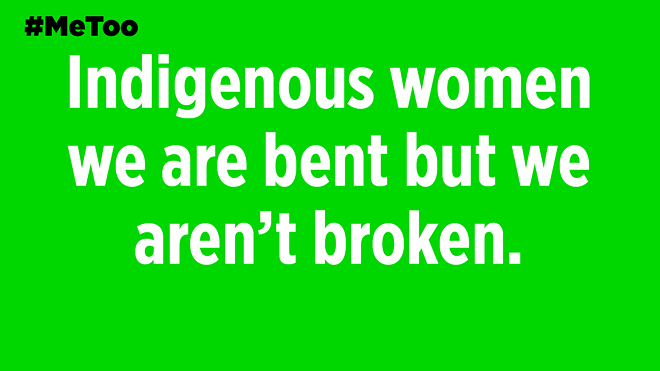Being an Indigenous woman in the U.S. is to be one of the people most at risk for sexual assault and violence: One in three of us will be victims of it, and 84 percent of us will experience violence of some kind.

But it's not as simple as some statistics. It's not as simple as keeping myself, and my daughters, safe, because European colonizers came to this land. Pre-Columbus, there are few stories of rape and murder among the Indigenous cultures of America. Even though the colonizer characterized and demonized to justify the crime of rape, pillage, and killing of us Indigenous cultures, rape just didn't exist like it did in European cultures.
So this legacy that every Indigenous woman carries is proportional to the legacy of rape and murder that white men carry with them as well. It's no surprise that we live in a country that supports and actively perpetuates rape culture. The rape and killing of Indigenous women and children are the brick and mortar in the foundation of our fine nation.
So my #MeToo story doesn't start with being molested by a close family member when I was 4, or the numerous times I was whistled at or catcalled whenever I walked on the street, or being hyper-aware when I walk to my car at night, or when a trusted older man who I called "uncle" grabbed me against my will and tried to kiss me while his hands wandered all over my body until my voice finally came back to me and I yelled stop. No, my story starts with the fact that Native women are murdered 10 times more than the national average.
My grandmother was beat to death by her intimate partner in Juneau, Alaska. Her name was Mabel Atoruk. Her life was taken away when she was 38. She was just 2 years older than I am now when she died. Her murderer, a white man, was never brought to justice and I don't even know his name because justice for Native women doesn't systemically exist. But what really bothers me is that I never got to meet my grandmother, I never got to see her face and know who she was. From all the stories from my relatives, I have quite a bit of her in me — not only in looks but also in fierceness and competitive spirit.
But the story only gets more grotesque. The same man who killed my grandmother, on the day of her funeral, raped my then-19-year-old mother. Yes, you read that correct: He raped my mother on the day they buried my grandmother after he beat her to death. These are just a few of the stories and legacies that colonization and rape culture have given to me and the women in my family.
I will tell you that as Indigenous women we are bent but we aren't broken. We have cracks and sharp edges but we can still fill our cup up with love and happiness. We have burns and scars in our hearts and on our bodies but we stand strong as we continue to thrive and heal even if no one else cares about us.
Indigenous women have faced hundreds of years of colonization, white supremacy, sexual assault, rape culture, misogyny and racism. And if you understand anything about power structures, you know that those things are so intertwined there is no way to separate them; we have to take them all down at once. So I wake up every day working to Indigenize every space that I walk into. I work at eliminating paternalism and sexism everywhere I go, I work at ending racism and white supremacy in every system in America, and I am raising Indigenous daughters and sons who have the power to do the same. ♦






















